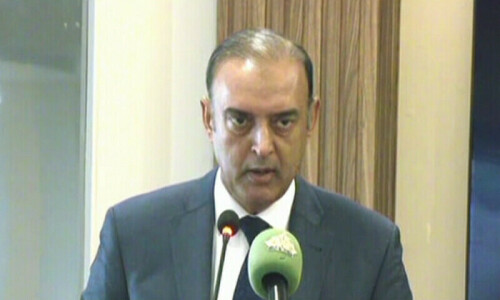ISLAMABAD, May 30: The Supreme Court was told on Wednesday that time had come to rectify its past mistakes of legalising unconstitutional measures, including the validation of the October 1999 military coup.
Senior advocate Fakhruddin G. Ebrahim, representing the Balochistan High Court Bar, also said that President Gen Pervez Musharraf could not be extended constitutional immunity because he had become president through “extra-constitutional measures”.
“My case is that President Musharraf is not a duly elected president and, therefore, does not enjoy constitutional immunity,” Mr Ebrahim argued before a 13-member larger bench of the apex court hearing identical petitions challenging the filing of a reference against the chief justice, composition of the Supreme Judicial Council and its competence to look into charges against the chief justice.
Mr Ebrahim recalled that Article 41 of the Constitution relating to the election of the president had been temporarily amended under the 17th Constitutional Amendment to allow him to get elected through a vote of confidence, instead of secret balloting, in violation of democratic and electoral spirit.
“That is why (the) president is not a constitutional president and as such he cannot avail immunity given to him under Article 248 and 211,” he argued.
Citing relevant judgments since 1999, Advocate Ebrahim deplored that the judiciary in the past had made a number of mistakes, inflicting a huge damage on the public in general and democracy in particular.
“Time has now come to rectify these mistakes because the ship of the state is sinking and the people are seeing the Supreme Court as the only saviour. Therefore, the judiciary should rise to the occasion for its independence.”
He said that in the Asma Jillani case, the Supreme Court had held that the military rule was alien to the ideology of Pakistan and the objectives resolution and declared General Yahya usurper.
“History of Pakistan would have been different had we adhered to this judgment in letter and spirit,” he said, adding that petitions including that of the chief justice before the instant bench was about nothing but strict adherence to the Constitution. “We are at the crucial stage of our country’s history and the entire nation is perturbed.”
The press was saying that the country was disintegrating, or a failed state, and one newspaper even said “we do not know where we are going”. “Now it is time that this court should tell where we are going,” Advocate Ebrahim said.
The Supreme Court validated the October 12, 1999, military coup in the Zafar Ali Shah case, but put certain bars on the government to hold elections within three years and not to bring amendments that should affect the basic features of the Constitution. But before three years had passed, a referendum order was promulgated to elect Gen Musharraf as president in derogation of the specific constitutional process, the counsel said, adding that referendum was not the election process for the presidency.
But, he said, the Supreme Court dismissed a challenge to the referendum order through a short order by stating that the petition was instituted prematurely. In its detailed order, he said, the Supreme Court declared the referendum valid, explaining that opinion could be sought from people on any question.
When the 17th Constitutional Amendment was challenged, the court again dismissed the petition by questioning its legal credentials, he regretted.
“I have serious reservations on the judgment on the 17th Amendment,” he said and urged the court to follow its verdict in the Mehmood Khan Achakzai case in which it had held that the system of parliamentary form of governance could not be changed.
He asked the court to follow the Indian judicial history and learn from a famous judgment in the Munarwa case, adding that without people’s power Pakistan would continue to “be called a failed state. The problem, he said, was that a person was not responsible for his wrongdoings if he was in power. “The wrongdoers have done a mockery of the Constitution but this trend should come to an end.”
Earlier, Advocate Hamid Khan, representing the Pakistan Bar Council, told the court that the prime minister could not have advised the president to file a reference against the chief justice without the approval of the cabinet.
He argued that the matter of removal of a chief justice entailed utmost significance and as such the advice of the prime minister should have been preceded by a meeting of the cabinet.
There are 16 articles of the Constitution where under the advice of the prime minister is necessary on certain issues like Articles 58(1), 92, 93, 100, 101, 153(3), 156(1), 164(4), 177(1), 181, 193(1), 197, 200, 203C(4B), 203F(3B) and 235(1) of the Constitution. Hamid Khan said Article 209 which related to the removal of a judge of superior courts did not require the advice of prime minister alone.
Earlier, Iftikhar Gillani, the counsel of another petitioner, submitted that under Article 211, the Supreme Court did not lose its jurisdiction and could take up any mala fide act of the president.














































Dear visitor, the comments section is undergoing an overhaul and will return soon.